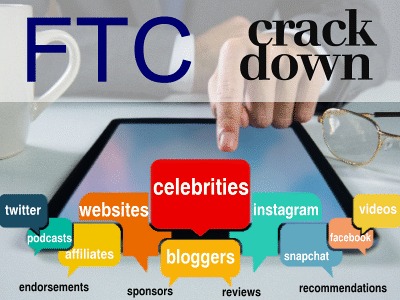FTC is Cracking the Whip on DisclosureJul142017

If you promote, endorse, sponsor, place affiliate links or testimonials on your Website, Blog or to Social Media - the FTC is becoming Real about cracking down on offenders to the Disclosure of Promoted Content issue.
It was in 2009 when the FTC initially released their Guideline relevant to the use of Online Endorsements and Testimonials. The intention was for Consumers to know when a Blogger, Affiliate or Celebrity was receiving any form of compensation from recommending a product to their audience.
In a nutshell, the FTC Guideline is:
If you're going to earn money or receive a benefit in any way, shape or fashion by endorsing or recommending a product or service, you’re required to disclose that fact.
You don’t have to be a big business or well known celebrity to get attention from the Federal Trade Commission (FTC) … they are watching. You just never know when they might stumble upon your Blog, Instagram account or Website, and make you the focus of their rule enforcement. We’ve listed below general best practices for posting online content you are compensated for.
The FTC Disclosure Best Practices:
The disclosure guiding principle is that it has to be clear and conspicuous.
The disclosure must be visible on the same page as the link/content, not as a link to a separate page, nor within a site’s navigation.
The disclosure should go as close to the beginning of content or a direct link as possible.
The disclosure cannot be styled to be less noticeable than your regular content, i.e. smaller fonts, very pale colors, etc.
The disclosure requirement must be met when rendered on all device types.
The disclosure must use clear language and avoid legalese and/or technical jargon.
The disclosure requirement applies to all mediums - videos, websites, social media, newsletters, ebooks, podcasts, webinars, recipes, etc.
The disclosure requirement must be met in limited space i.e. Twitter. Use #Ad or #ad
“Sponsored”, “Promotion”, “Paid ad”, "I've partnered with _____" are also acceptable.
The disclosure criteria is not limited to cash. Forms of compensation include affiliate commissions, direct payments, something received for free or at a discount, and encompasses compensation in the form of products, experiences or services.
The disclosure is mandatory if you review or talk about a product or service (even if it’s a free product/service) in which you received any tangible or intangible form of compensation, regardless if your review, comment or documentary is positive, negative or neutral.
The disclosure is not required on Standard Advertisements which do not fall under the FTC Disclosure requirements such as Banner Ads, Sidebar Ads, AdSense … from companies such as Google, CJ.com, Linkshare, etc.
Recent FTC Disclosure Warnings and Violations Issued To:
Warner Brothers, Lunada Biomedical, Lord & Taylor, Cabela’s, Johnson & Johnson, Eos Products, Yves Saint Laurent, Lorac Cosmetics, Chanel, Puma, Jennifer Lopez, Victoria Beckham, Lindsay Lohan, Kourtney Kardashian, Heidi Klum, Naomi Campbell, Kristin Cavallari, and many more.
Recommended Reading on the FTC website:
FTC Active Disclosure Violations
https://www.ftc.gov/news-events/blogs/terms/231
Dot Com Disclosures
https://www.ftc.gov/news-events/press-releases/2013/03/ftc-staff-revises-online-advertising-disclosure-guidelines
What People are Asking
https://www.ftc.gov/tips-advice/business-center/guidance/ftcs-endorsement-guides-what-people-are-asking
For Brands and Businesses
https://www.ftc.gov/tips-advice/business-center/guidance/native-advertising-guide-businesses
The lesson is - It’s Better to Be Safe than Sorry.
Make sure you're in compliance with the FTC Disclosure Law on Promoted Content.
Return



